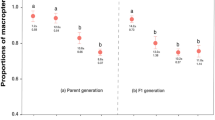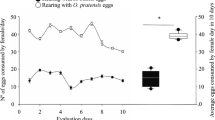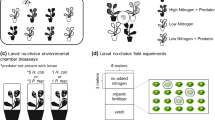Abstract
Predator–prey interactions primarily focus on prey life-stages that are consumed. However, animals in less vulnerable life-stages might also be influenced by the presence of a predator, making our understanding of predation-related impacts across all life-stages of prey essential. It has been previously demonstrated that Podisus maculiventris is a voracious predator of eggs and larvae of Leptinotarsa decemlineata, and that larvae will alter their behavior to avoid predation. However, the adult beetles are not readily consumed by P. maculiventris, raising the question of whether they will respond to predators to protect themselves or their offspring. Here, we examine the effect of predation risk by P. maculiventris, on three adult behaviors of L. decemlineata; colonization, oviposition, and feeding, and the resulting impact on host plant damage. In an open-field test, there was no difference in natural beetle colonization between plots with predation risk and control treatments. However, subsequent host plant damage by adult beetles was 63.9% less in predation risk treatments. Over the lifetime of adult beetles in field mesocosms, per capita feeding was 23% less in the predation risk treatment. Beetle oviposition was 37% less in the presence of predators in a short-term, greenhouse assay, and marginally reduced in longer term field mesocosms. Our results indicate that predation risk can drive relatively invulnerable adult herbivores to adjust behaviors that affect themselves (feeding) and their offspring (oviposition). Thus, the full impact of predator presence must be considered across the prey life cycle.



Similar content being viewed by others
References
Bernays EA (1997) Feeding by lepidopteran larvae is dangerous. Ecol Entomol 22:121–123. https://doi.org/10.1046/j.1365-2311.1997.00042.x
Blaustein L, Kiflawi M, Eitam A et al (2004) Oviposition habitat selection in response to risk of predation in temporary pools: mode of detection and consistency across experimental venue. Oecologia 138:300–305. https://doi.org/10.1007/s00442-003-1398-x
Boiteau G (1988) Sperm utilization and post-copulatory female-guarding in the Colorado potato beetle, Leptinotarsa decemlineata. Entomol Exp Appl 47:183–187. https://doi.org/10.1111/j.1570-7458.1988.tb01134.x
Bond J, Arredondo-Jimenez J, Rodriguez M et al (2005) Oviposition habitat selection for a predator refuge and food source in a mosquito. Ecol Entomol 30:255–263
Buchanan AL, Hermann SL, Lund M, Szendrei Z (2017) A meta-analysis of non-consumptive predator effects in arthropods: the influence of organismal and environmental characteristics. Oikos 126:1233–1240. https://doi.org/10.1111/oik.04384
Chamaillé-Jammes S, Malcuit H, Le Saout S, Martin J-L (2014) Innate threat-sensitive foraging: black-tailed deer remain more fearful of wolf than of the less dangerous black bear even after 100 years of wolf absence. Oecologia 174:1151–1158. https://doi.org/10.1007/s00442-013-2843-0
Cherry MJ, Conner LM, Warren RJ (2015) Effects of predation risk and group dynamics on white-tailed deer foraging behavior in a longleaf pine savanna. Behav Ecol 26:1091–1099. https://doi.org/10.1093/beheco/arv054
Fill A, Long EY, Finke DL (2012) Non-consumptive effects of a natural enemy on a non-prey herbivore population. Ecol Entomol 37:43–50. https://doi.org/10.1111/j.1365-2311.2011.01333.x
Freinschlag J, Schausberger P (2016) Predation risk-mediated maternal effects in the two-spotted spider mite, Tetranychus urticae. Exp Appl Acarol 69:35–47. https://doi.org/10.1007/s10493-016-0014-9
Griffin CAM, Thaler JS (2006) Insect predators affect plant resistance via density- and trait-mediated indirect interactions. Ecol Lett 9:335–343. https://doi.org/10.1111/j.1461-0248.2005.00880.x
Hare JD (1990) Ecology and management of the Colorado potato beetle. Annu Rev Entomol 35:81–100
Hermann SL, Landis DA (2017) Scaling up our understanding of non-consumptive effects in insect systems. Curr Opin Insect Sci 20:54–60
Hermann SL, Thaler JS (2014) Prey perception of predation risk: volatile chemical cues mediate non-consumptive effects of a predator on a herbivorous insect. Oecologia 176:669–676. https://doi.org/10.1007/s00442-014-3069-5
Hough-Goldstein J, McPherson D (1996) Comparison of Perillus bioculatus and Podisus maculiventris (Hemiptera: Pentatomidae) as potential control agents of the Colorado potato beetle (Coleoptera: Chrysomelidae). J Econ Entomol 89:1116–1123
Hough-Goldstein JA, Heimpel GE, Bechmann HE, Mason CE (1993) Arthropod natural enemies of the Colorado potato beetle. Crop Prot 12:324–334. https://doi.org/10.1016/0261-2194(93)90074-S
Hufnagel M, Schilmiller AL, Ali J, Szendrei Z (2017) Choosy mothers pick challenging plants: maternal preference and larval performance of a specialist herbivore are not linked. Ecol Entomol 42:33–41. https://doi.org/10.1111/een.12350
Jaenike J (1978) Optimal ovipostion behavior in phytophagous insects. Theor Popul Biol 14:350–356. https://doi.org/10.1016/0040-5809(78)90012-6
Jermy T, Szentesi Á, Horváth J (1988) Host plant finding in phytophagous insects: the case of the Colorado potato beetle. Entomol Exp Appl 49:83–98. https://doi.org/10.1007/BF00188242
Kaplan I, Thaler J (2010) Plant resistance attenuates the consumptive and non-consumptive impacts of predators on prey. Oikos 119:1105–1113. https://doi.org/10.1111/j.1600-0706.2009.18311.x
Kaplan I, McArt SH, Thaler JS (2014) Plant defenses and predation risk differentially shape patterns of consumption, growth, and digestive efficiency in a guild of leaf-chewing insects. PLoS One. https://doi.org/10.1371/journal.pone.0093714
Lee DH, Nyrop JP, Sanderson JP (2011) Avoidance of natural enemies by adult whiteflies, Bemisia argentifolii, and effects on host plant choice. Biol Control 58:302–309. https://doi.org/10.1016/j.biocontrol.2011.06.005
Lefèvre T, Oliver L, Hunter MD, De Roode JC (2010) Evidence for trans-generational medication in nature. Ecol Lett 13:1485–1493. https://doi.org/10.1111/j.1461-0248.2010.01537.x
Lima SL, Dill LM (1990) Behavioral decisions made under the risk of predation: a review and prospectus. Can J Zool 68:619–640. https://doi.org/10.1139/z90-092
MacLeod KJ, Krebs CJ, Boonstra R, Sheriff MJ (2017) Fear and lethality in snowshoe hares: the deadly effects of non-consumptive predation risk. Oikos 127:375–380. https://doi.org/10.1111/oik.04890
Munga S, Minakawa N, Zhou G et al (2006) Effects of larval competitors and predators on oviposition site selection of Anopheles gambiae sensu stricto. J Med Entomol 43:221–224
Ninkovic V, Feng Y, Olsson U, Pettersson J (2013) Ladybird footprints induce aphid avoidance behavior. Biol Control 65:63–71. https://doi.org/10.1016/j.biocontrol.2012.07.003
Peckarsky B, Taylor B, Caudill C (2000) Hydrologic and behavioral constraints on oviposition of stream insects: implications for adult dispersal. Oecologia 125:186–200. https://doi.org/10.1007/s004420000446
Preisser E, Bolnick D, Benard M (2005) Scared to death? The effects of intimidation and consumption in predator–prey interactions. Ecology 86:501–509
Ramirez RA, Crowder DW, Snyder GB et al (2010) Antipredator behavior of Colorado potato beetle larvae differs by instar and attacking predator. Biol Control 53:230–237. https://doi.org/10.1016/j.biocontrol.2010.01.004
Rendon D, Whitehouse MEA, Taylor PW (2016) Consumptive and non-consumptive effects of wolf spiders on cotton bollworms. Entomol Exp Appl 158:170–183. https://doi.org/10.1111/eea.12390
Rypstra AL, Buddle CM (2013) Spider silk reduces insect herbivory. Biol Lett 9:20120948. https://doi.org/10.1098/rsbl.2012.0948
Schmitz OJ, Beckerman AP, O’Brien KM (1997) Behaviorally mediated trophic cascades: effects of predation risk on food web interactions. Ecology 78:1388–1399
Schmitz OJ, Krivan V, Ovadia O (2004) Trophic cascades: the primacy of trait-mediated indirect interactions. Ecol Lett 7:153–163. https://doi.org/10.1111/j.1461-0248.2003.00560.x
Sendoya SF, Freitas AVL, Oliveira PS (2009) Egg-laying butterflies distinguish predaceous ants by sight. Am Nat 174:134–140. https://doi.org/10.1086/599302
Sheriff MJ (2015) The adaptive potential of maternal stress exposure in regulating population dynamics. J Anim Ecol 84:323–325. https://doi.org/10.1111/1365-2656.12334
Sheriff MJ, Thaler JS (2014) Ecophysiological effects of predation risk; an integration across disciplines. Oecologia 176:607–611. https://doi.org/10.1007/s00442-014-3105-5
Sheriff MJ, Krebs CJ, Boonstra R (2009) The sensitive hare: sublethal effects of predator stress on reproduction in snowshoe hares. J Anim Ecol 78:1249–1258. https://doi.org/10.1111/j.1365-2656.2009.01552.x
Sheriff MJ, Mcmahon EK, Krebs CJ, Boonstra R (2015) Predator-induced maternal stress and population demography in snowshoe hares: the more severe the risk, the longer the generational effect. J Zool 296:305–310. https://doi.org/10.1111/jzo.12249
Sitvarin MI, Breen K, Rypstra AL (2015) Predator cues have contrasting effects on lifespan of Pardosa milvina (Araneae: Lycosidae). J Arachnol 43:107–110. https://doi.org/10.1636/J14-48.1
Stav G, Blaustein L, Margalith J (1999) Experimental evidence for predation risk sensitive oviposition by a mosquito, Culiseta longiareolata. Ecol Entomol 24:202–207. https://doi.org/10.1046/j.1365-2311.1999.00183.x
Sullivan T, Nordstrom L, Sullivan D (1985) Use of predator odors as repellents to reduce feeding damage by herbivores: IV. Northern pocket gophers (Thomomys talpoides). J Chem Ecol 14:379–389. https://doi.org/10.1007/BF01012078
Swihart R, Pignatello J, Mattina M (1991) Aversive responses of white-tailed deer, Odocoileus virginianus, to predator urines. J Chem Ecol 17:767–777
Tallamy DW (1984) Insect parental care. Bioscience 34:20–24. https://doi.org/10.2307/1309421
Tan K, Hu Z, Chen W et al (2013) Fearful foragers: honey bees tune colony and individual foraging to multi-predator presence and food quality. PLoS One. https://doi.org/10.1371/journal.pone.0075841
Thaler JS, Griffin CAM (2008) Relative importance of consumptive and non-consumptive effects of predators on prey and plant damage: the influence of herbivore ontogeny. Entomol Exp Appl 128:34–40. https://doi.org/10.1111/j.1570-7458.2008.00737.x
Thaler JS, McArt SH, Kaplan I (2012) Compensatory mechanisms for ameliorating the fundamental trade-off between predator avoidance and foraging. Proc Natl Acad Sci 109:12075–12080. https://doi.org/10.1073/pnas.1208070109
Thompson JN (1988) Evolutionary ecology of the relationship between oviposition preference and performance of offspring in phytophagous insects. Entomol Exp Appl 47:3–14. https://doi.org/10.1111/j.1570-7458.1988.tb02275.x
Tigreros N, Norris RH, Wang EH, Thaler JS (2017) Maternally induced intraclutch cannibalism: an adaptive response to predation risk? Ecol Lett 20:487–494. https://doi.org/10.1111/ele.12752
Vonesh JR, Blaustein L (2011) Predator-induced shifts in mosquito oviposition site selection: a meta-analysis and implications for vector control. Isr J Ecol Evol 56:263–279. https://doi.org/10.1560/IJEE.56.3-4.263
Werner EE, Peacor SD (2003) A review of trait-mediated indirect interactions in ecological communities. Ecology 84:1083–1100. https://doi.org/10.1890/0012-9658(2003)084[1083:Arotii]2.0.Co;2
Wheeler D (2009) Suitability of different artificial diets for development and survival of stages of the predaceous ladybird. Annu Rev Entomol 41:10–12. https://doi.org/10.1146/annurev.en.41.010196.002203
Wineland SM, Kistner EJ, Joern A (2015) Non-consumptive interactions between grasshoppers (Orthoptera: Acrididae) and wolf spiders (Lycosidae) produce trophic cascades in an old-field ecosystem. J Orthoptera Res 24:41–46. https://doi.org/10.1665/034.024.0101
Xiong X, Michaud JP, Li Z et al (2015) Chronic, predator-induced stress alters development and reproductive performance of the cotton bollworm, Helicoverpa armigera. BioControl 60:827–837. https://doi.org/10.1007/s10526-015-9689-9
Acknowledgements
We thank Marie Russel, Elizabeth Davidson-Lowe, Alyssa Cowles, Scott Nelson, Stephen Pecylak, Evan Hoki, and Dylan Beal for assistance in running experiments. Special thanks to Charlie Linn, Katja Poveda, Jared G. Ali, Douglas A. Landis, and two anonymous reviewers for thoughtful comments on the working manuscript. This project was supported by NIFA 2013-02649 and NYC-139851.
Author information
Authors and Affiliations
Contributions
SH and JT formulated the study, performed the experiments, designed the experiments and wrote the manuscript.
Corresponding author
Ethics declarations
Conflict of interest
The authors declare that they have no conflict of interest.
Additional information
Communicated by Sven Bacher.
This work explores how predation risk alters herbivore life history. These lab and field studies provide evidence that risk influences oviposition and feeding of invulnerable life-stages of insects.
Rights and permissions
About this article
Cite this article
Hermann, S.L., Thaler, J.S. The effect of predator presence on the behavioral sequence from host selection to reproduction in an invulnerable stage of insect prey. Oecologia 188, 945–952 (2018). https://doi.org/10.1007/s00442-018-4202-7
Received:
Accepted:
Published:
Issue Date:
DOI: https://doi.org/10.1007/s00442-018-4202-7




